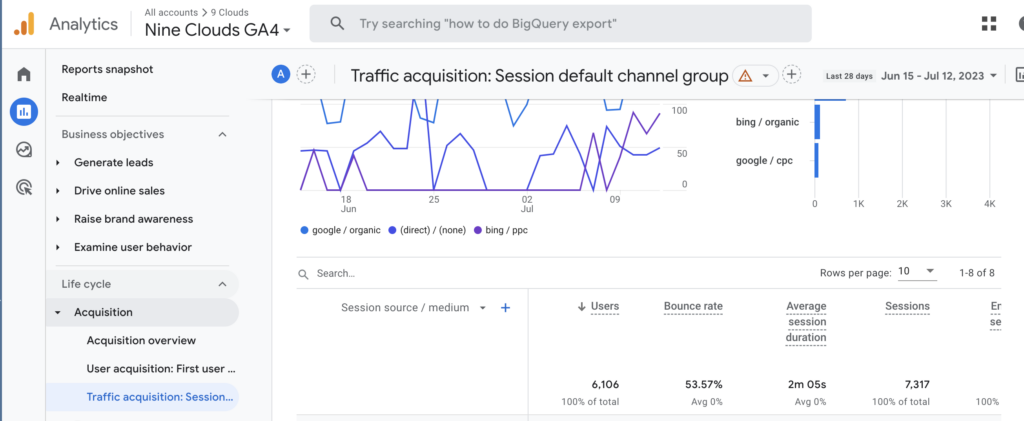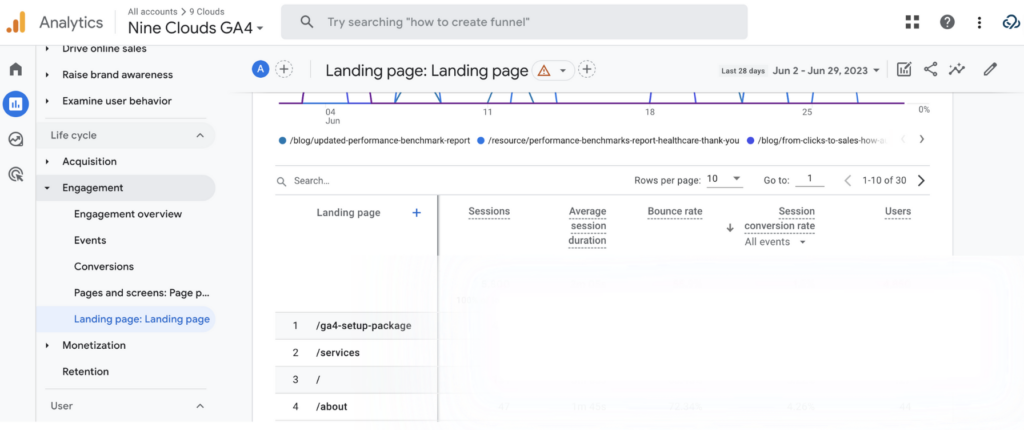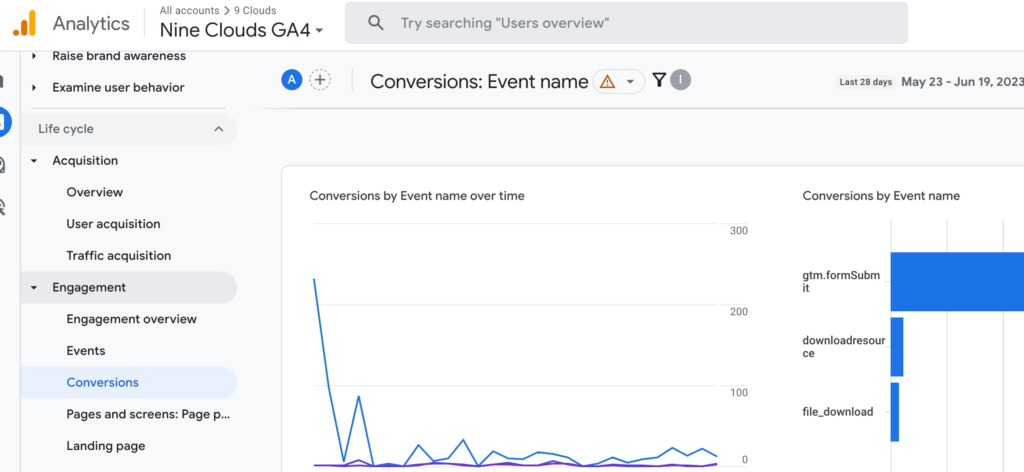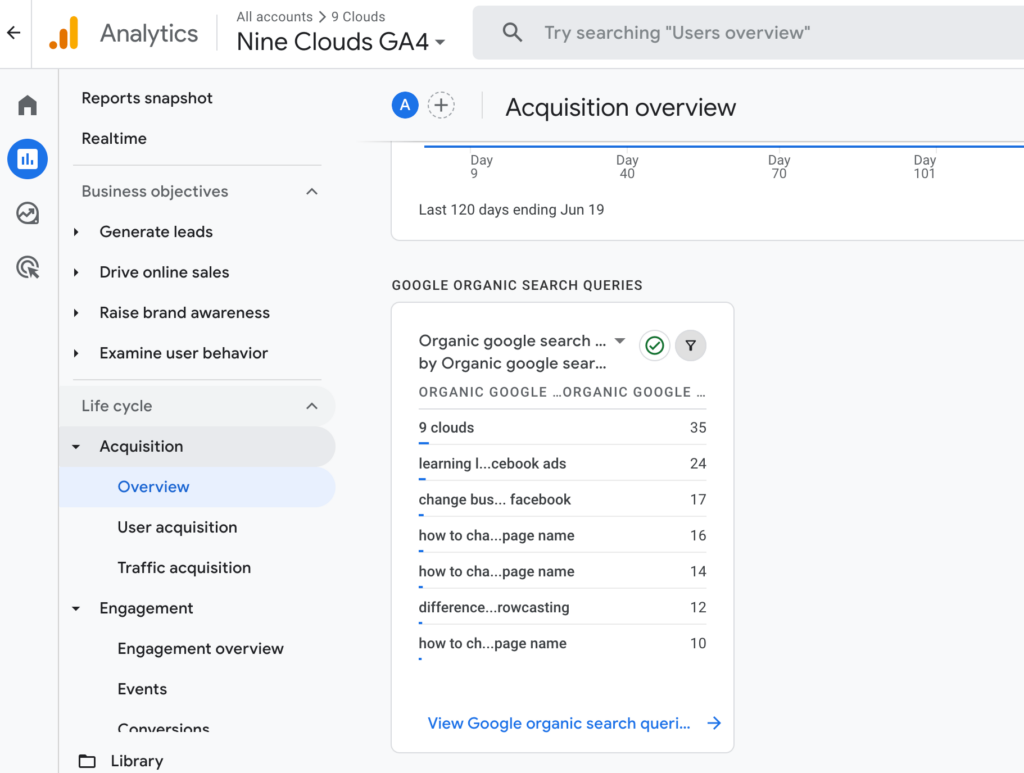
What Organic SEO Metrics Should You Track (Plus How to Check Them in GA4)
In the 1989 film Field of Dreams, farmer Ray Kinsella said, “If you build it, they will come.”
For reference, he was talking about a baseball field in the middle of an Iowan corn field. In the movie, he did, in fact, build it — and “they” (the ghosts of famous baseball players) came.
However, if you’re using the “if you build it, they will come” mindset when building your website, you are setting yourself up for disappointment. Without the right SEO strategy, it is a safe bet that very few people (other than your mom) will visit your site.
What is SEO and Why Does it Matter?
SEO — or search engine optimization — is the process of improving your website to appear on search engines.
We live in a digital age where the answers to our questions are just a Google search away. Search engines have a system of ranking the quality of your content to appear when people search. Google’s most recent updates focus on improving search and also focuses on user-centered content.
Your SEO practices will determine whether or not your content appears for users.
Tracking Your SEO Metrics in Google Analytics
The hardest part of an SEO strategy is there is no clear road map that will get you from Point A to Point B. Even with a perfect SEO strategy in place, it still takes time for Google to recognize and trust your site.
Focusing on these metrics in Google Analytics, however, will help you track your progress, see the big picture in your strategy, and identify what is and what is not working along the way.
Bounce Rate
Your bounce rate is the percentage of people who land on your website and then leave without engaging or visiting another page on your website.
Think of it as taking a bite of food at a restaurant, but not sticking around for dessert. Your bounce rate is telling Google that your content isn’t engaging the people visiting your site, therefore impacting your SEO score.
A high bounce rate might indicate that your content is not rendering well for a particular device or that it simply isn’t meeting the needs of searchers.
Google wants users to have a good experience on your website. A high bounce rate on a mobile device will tell Google that your site isn’t mobile friendly, which will negatively affect your SEO.
To lower your bounce rate, link to relevant and interesting content throughout your post.
Session Duration
Understanding where your audience is entering your site is also important. And by viewing the average session duration by channel, you can see where your most engaged audience is coming from.
With this information, you can make an educated decision about where to spend your energy and resources (i.e. Facebook, Google, TikTok).
How to find your bounce rate and session duration for your site in Google Analytics:

Google Analytics Navigation: Report > Life Cycle > Acquisition > Traffic Acquisition: Session Default channel group > Customize the report to include bounce rate and average session duration metrics.
Landing Pages
If you have specific landing pages or forms on your site, there is an easy way to see how those pages do in GA4 reports as well.
This data could be very helpful for a sales team or just anyone looking to see which pages and forms are seeing conversions. That’s just from SEO data!
Make sure to add session conversion rate as a metrics in this report, and then filter your conversion event by form submissions to get data on what which specific forms customers are filling out and which they are not.
How to find your landing page metrics in Google Analytics:

Google Analytics Navigation: Reports > Lifecycle > Engagement > Landing Pages > Customize report > Add session conversion rate as a metric
Event Conversions
Google Analytics gives you the capability to set goals for your website. These could include destination, duration or events like form submissions, phone calls or purchases.
Take the time to examine what goals are important to your website and what benchmarks you will use to measure them. Once your events are set, you can track the metrics of conversions to better understand your audience’s behavior on your website.
How to find conversions in Google Analytics:

Google Analytics Navigation: Reports > Life Cycle > Engagement > Conversions
Keyword Ranking
More doesn’t necessarily mean better, and that is the case with keyword ranking metrics. Your energy is best spent by picking keywords that have high volume and low competition — and most importantly, ones that answer your potential customers’ or customers’ questions.
In order to view search query information in Google Analytics, enable Search Console data sharing. These queries give you a look into what your audience is thinking by showing the exact phrase they typed in on Google.
How to see what people searched before landing on your site in Google Analytics:

Google Analytics Navigation: Reports > Life Cycle > Acquisition > Overview > Scroll to Bottom of Page
These queries are the exact terms users are searching that bring them to the content on your website.
Using keyword ranking data is a great way to inform your SEO strategy. With this information, you can easily figure out what terms you need to include on a webpage.
How does SEO impact your SEM?
Search engine marketing (SEM) goes hand in hand with SEO.
SEO focuses on organic traffic (the free stuff), and SEM focuses on paid traffic. For your ad rankings in SEM, Google takes into account the quality of your site and how high it’s ranked for the keywords you’re bidding on.
When your site is highly ranked by Google and has been fully optimized for SEO (which takes time), your ad clicks will cost less and you’ll already rank higher up on the page, so you won’t need to spend as much on your SEM. A really strong SEO strategy can mean savings for your business on the SEM side over time.
SEO requires a time investment and patience. But your efforts can and will be rewarded when you can scale back on your SEM efforts in the future due to the time you invested in your SEO from the start.
Learn More About Organic SEO
Although organic SEO can be overwhelming, understanding these basic metrics will help you make a clear strategy going forward. And while you might not be able to view the whole picture yet, these data points are a great place to start.
Itching to know more about how 9 Clouds does SEO?
SHOW UP WITH SEO FROM 9 CLOUDS


![Human vs AI A/B Test [Spoiler Alert: Humans Win!]](https://9clouds.com/wp-content/uploads/2024/02/Volvo-dealership-1-600x388.png)


